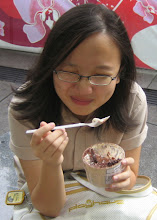My parents' filial piety trumps mine every time, as we spend a good part of every Father's Day with my only surviving grandfather (and thus the whole family) at his annual Father's Day dinner.
Us kids go upstairs, as usual, to take my grandparents to the Zhi Char restaurant downstairs - the only place we ever eat together now that walking has become a problem for both of them. The hike upstairs never differs. It begins with my infant brother's grumpiness at having to perform the same chore over and over again, then speeds up to a race among the three of us to get to the gate. I've always marvelled at my grandparents' gate - it doesn't just keep uninvited guests locked out, it also arrests words. Our gleeful noise slams straight into the wrought metal and dies.
My halting Hainanese takes over, because not talking, obviously, is a bit of a hinderance. My recent attempts at loosening my dialect tongue has pleased the grandmothers on either side - although it must be confessed that their kindly smiles often freeze in incomprehension when I muddle my Hainanese with Teochew and my Teochew with Mandarin. But today my grandfather greets us at the door instead.
He is shaving, although the white strands on the sagging folds of his jowls never so much brush the blades. He starts at our arrival, then as we chirp our greeting, he laughs loudly and politely, the way Chinese always do with strangers.
I'm here to bring you downstairs
Eh! Good child, good child
His eyes glaze over, and goes back to shaving. I repeat myself with rigidly structured sentences only ineptness can accomplish.
For what?
To eat!
Oh. Eat.
Daddy's waiting downstairs. Go change your clothes
Oh. Tank - kew (Thank you)
The words "Thank you" have become his whole vocabulary when he speaks to us, English but for the enunciation, Hainanese but for the origin, language but for its lack of meaning. His grandchildren say hello, he says thank you. His grandchildren ask him a question, he says thank you. His grandchildren ask him to eat, he says thank you. His grandchildren say thank you, he says thank you. His grandchildren say goodbye, he says thank you. We are all named "Alan" - the name of his last grandson.
We guide his feet into his sandals as he fumbles around. He jerks away our grasps. He can't remember his own name, but he hasn't lost his sense of self. We bundle our grandmother into her wheelchair as she clings onto our hands long after she no longer needs them, squeezing our palms and takes every opportunity to count our teeth. We take twelve minutes to recover the land my siblings and I crossed in five.
We begin each dish with my father and his brother crossing my grandfather's plate, then my grandmother's. Then the dish makes its round and conversation begins. We talk about money, work, school, the newest purchase, the latest movie. The reason for our gathering fades into oblivion as he sucks happily on butter prawn heads.
Then my mom breaks the unspoken custom. "Does your father recognize your children?" She addresses my uncle. The table falls silent. We look at my grandfather. He wipes gravy from his chin with the back of his hand, with a kind of oblivion rivalled only by our earlier display. No need for an answer.
My father slams his chopsticks down reproachfully, "You kids don't see him enough to remember you, that's why!" The unnecessary strength turns the tips of his chopsticks towards himself in an awkward display. I don't know if you know, but there's silent, then there's silent. We become the latter.
The dinner resumes, slowly but surely. You know the worst has happened when things go on as if it never happened. Dinner goes on as if it never happened.
The dinner ends. I walk up to my grandfather and help him out of his chair. He tenses.
I say, Let me hold you.
He looks at me curiously. He relaxes for a moment, then he goes "no need, no need".
My father takes over and my grandfather relegates responsibility for his being into the arms of his son. There is no need for a grandchild like me. In his memory that stops twenty, thirty, forty years ago, there is no need for grandchildren.
Subscribe to:
Post Comments (Atom)

No comments:
Post a Comment